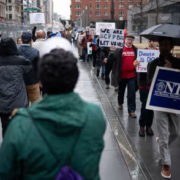Congress Was About to Wreck the Economy… Until THIS Happened!
Here we are again, watching Congress stumble around like a bunch of toddlers arguing over a toy, except in this case, the “toy” is the entire functioning of the U.S. government. And just when you thought it was all about to go dark, enter Senate Democrat Chuck Schumer, stage right, backing a Republican stopgap funding bill to avert a government shutdown.
Yes, you read that correctly. A leading Democrat supporting a Republican-led measure. The result? Outrage, pearl-clutching, and enough internal Democratic Party drama to make a reality TV producer salivate.
The Politics of Panic
Let me make one thing abundantly clear: I don’t particularly care who gets to take credit for keeping the government’s lights on. But I do find it fascinating how we keep getting into these completely avoidable crises. The entire system is like a dysfunctional game of economic chicken—except instead of two cars barreling toward each other, it’s two political parties holding the economy hostage for ideological grandstanding.
Schumer’s move is, at its core, pragmatic. While some of his fellow Democrats are foaming at the mouth over his apparent “capitulation” to Republican demands, he has a pretty simple calculus: a shutdown is bad for the economy, bad for government workers, and—let’s be real—bad for anyone in office when voters start missing paychecks. The alternative? Holding out for a more progressive funding bill, watching the government grind to a halt, and giving Republicans a golden opportunity to blame Democrats for the ensuing mess. And let’s be honest, Republicans would absolutely do that, with all the subtlety of a sledgehammer to a glass table.
The Economic Fallout That Almost Happened
For those of you fortunate enough to not have to follow these fiscal shenanigans for a living, let me summarize what a government shutdown actually means in economic terms:
- Federal employees and contractors stop getting paid. That’s hundreds of thousands of workers suddenly tightening their belts and cutting spending, which—surprise!—affects businesses and local economies.
- Markets don’t like uncertainty. Investors hate when Washington plays with fire, and a shutdown jitters the markets, leading to fluctuations that could hurt retirement accounts, portfolios, and overall consumer confidence.
- Essential services get stretched thin. Sure, Social Security checks still go out, and the military still operates, but good luck with anything requiring a federal agency that isn’t deemed “essential.” Need a passport? Filing for a small business loan? Too bad.
- It’s a self-inflicted GDP wound. Every time we get close to or enter a shutdown, it shaves off economic growth, slows productivity, and creates inefficiencies. The 2018-2019 shutdown alone cost the U.S. economy an estimated $11 billion, according to the Congressional Budget Office. Basically, it’s Congress slapping itself in the face and then asking why its head hurts.
The Democratic Civil War (Or Just a Family Squabble?)
Now, let’s talk about the real drama: the intra-party Democratic meltdown over Schumer’s decision.
Some Democrats see this as an outright betrayal—a weak-kneed capitulation to Republicans at a time when they believe their party should be holding firm. From a political standpoint, I get it. Schumer aligning with a GOP-backed funding bill is about as welcome to progressives as a tax cut for billionaires at a Bernie Sanders rally.
But let’s be real: What was the alternative? Letting the government shut down as a form of political protest? That’s not exactly a great campaign slogan for 2024. “Vote for us—we let everything fall apart to prove a point!”
Schumer is doing what any politician with an ounce of survival instinct would do: avoid a crisis, even if it means swallowing a bitter pill. Sure, it may not be the bold, progressive move that some Democrats wanted, but it keeps the machine running. And let’s face it, if we’re debating the finer points of who wins and loses in a stopgap bill scenario, we’ve already lost the plot.
The Bigger Picture: A Dysfunctional Fiscal System
This whole saga is just another symptom of a bigger disease—Congress’s addiction to governing by crisis. Instead of actually passing long-term, sustainable budgets, we get these stupid stopgap bills every few months. It’s like trying to fix a leaking pipe with duct tape and then acting surprised when it bursts again.
If you think this latest drama is a one-time event, think again. We’ll be back here in a few months, rinse and repeat, because our elected officials have all the long-term financial planning skills of a teenager with a credit card.
So, while Schumer’s move may have averted disaster today, I wouldn’t pop the champagne just yet. The real question isn’t “Did we avoid a shutdown?”—it’s “How long until the next one?” And if history is any indicator, I’d say…not long.
Enjoy the brief reprieve. It won’t last.







Leave a Reply
Want to join the discussion?Feel free to contribute!